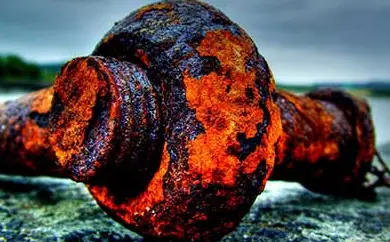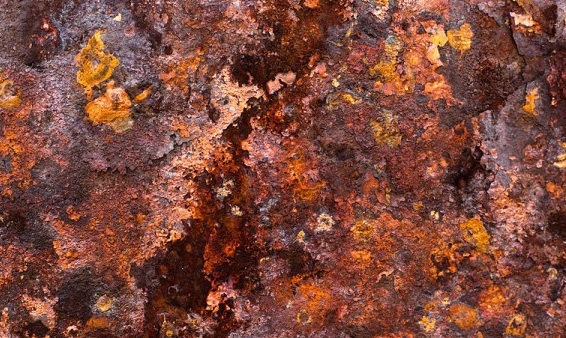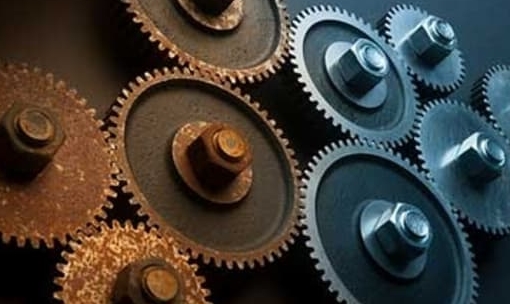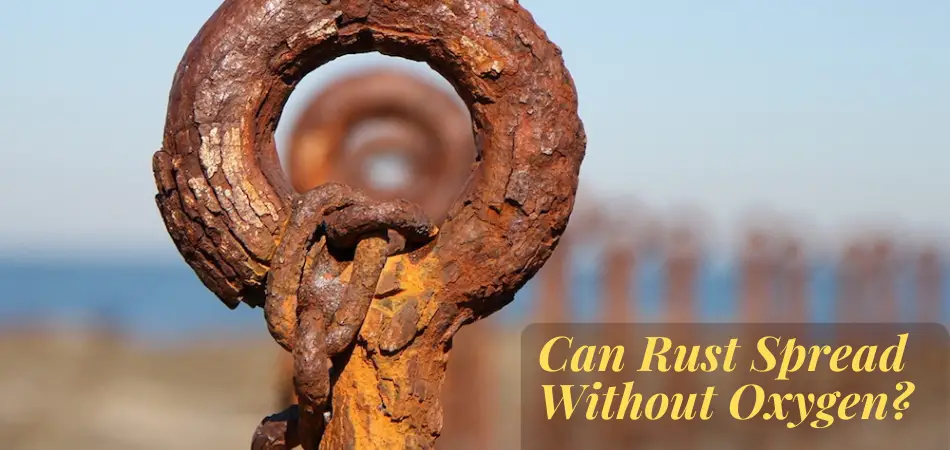Rust is a specific type of corrosion, and it can only occur when iron reacts with oxygen and water to produce hydrated iron (III) oxides. Because iron and oxygen don’t react on their own, water is necessary to spread rust around. In summary, there would be no rust without moisture, but can rust spread without oxygen?
No, rust cannot spread without oxygen. Oxygen is an important reagent needed for rust to spread. However, there are plenty of rust protection products and coatings that can help protect the metal from rust spreading in those instances where there is the presence of rust reagents.
Without further delay, you will learn more about metal rust, facts about rust, and how to prevent and stop rust in the future on this page. Keep reading!
Contents
How Does Metals Rust?
When iron reacts with oxygen in water or moisture, it results in a reddish-brown compound; – iron oxide – corrosion which is termed rust. When rust sets in, some factors, such as saltwater, expedite the rusting process. How so? Like I earlier opined, rust is a chemical reaction; chemical reactions involve the exchange of electrons. These electrons are liberated and exchanged faster in saltwater than in your regular pure water.

However, let me state unequivocally at this point that not all metals rust. Aluminum, for instance, is a metal that doesn’t rust because of aluminum oxide, which is a protective layer on its surface. That layer prevents direct contact with oxygen and water or moisture (in the air). Hence, rusting is impeded.
Iron, on the other hand, is an element with a high affinity for oxygen; that is, it is quickly oxidized. When this reaction happens in water or moisture (which is also a component of air like oxygen), rusting occurs. That is why iron sheets rust easily and quickly by basic prolonged exposure to air.
Rusting: Oxygen or Water?
Now, take a car for instance, even if the engine is brand new and in perfect working condition, it wouldn’t work still if there was no fuel in it. Fuel is chemical energy that is converted to mechanical energy (and heat energy as a by-product). If the engine is perfect and there’s fuel but the battery is faulty, the car won’t kick-start either. It implies that all working conditions to kick-start a vehicle must have been met before you can drive it. In the same vein, all factors necessary for rusting to set in must be met before rusting occurs.
The absence of either oxygen or water will prevent rusting. Rusting cannot occur without the presence of both oxygen and water. The chemical reaction that leads to rust begins with an exchange of electrons between iron and oxygen where iron loses its electrons to oxygen. Then ferric ions react with water to produce hydroxides of iron, which becomes dehydrated to produce more iron compounds. Consequently, the rust flakes, which fall off, exposing new iron, however, to further rust.
Some Undeniable Facts about Rusting
Other than the facts that rusting cannot occur without oxygen and some other chemical facts, some of which have been mentioned, one other interesting fact to note is that:

- Rusting of iron is an irreversible process. Once a metal has rusted, that part is forever damaged; it has suffered a chemical process, effecting a change that cannot be reversed.
- The volume of rust is directly proportional to the volume of metal consumed. This means that while it is possible for rust to consume a metal completely, spotting rust on metal does not necessarily indicate the depth of damage as in the case of thick metal. The implication is that there could remain uncompromised structural integrity of metal remaining underneath the visible rust.
- Rusting is a self-completing process as long as the risk factors remain constant. It doesn’t come to a point where the process goes, “alright, we’ve had enough of this metal; let’s get out of here on to another metal land”. Unlike some metals such as copper or certain alloys of iron (made of stainless steel), their oxidation reaches an impenetrable layer that halts the process and protects the metal from further oxidation. Rusting, on the other hand, is not self-limiting.
How to Prevent Rust?
One thing to do, and perhaps the most important elementary thing, is to keep your metal clean and dry. However, there are other available options such as protecting your metal with a protective covering. Some protective coatings even protect already rusting metals. Although they undo the already damaged part but can prevent further rusting.

For instance, galvanization is a process manufacturers of steel used to protect the metal from rusting. Steel is dipped in zinc coating, which protects it.
How to Stop Rust
The best way to solve the rust problem is to prevent its onset in the first place because rust, being a pervasive problem, continues until its completion. The way to stop a corroding metal, however, is to remove the corrosive parts and protect the base metal and also limit the level of exposure. A dehumidifier can be easily used if you reside in a very humid climatic region.


